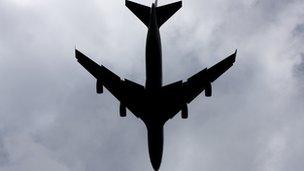US rejects European Court ruling on airline emissions
- Published

The tax had been opposed by US, Canadian and Chinese airlines
The US says EU plans for an emissions tax on airlines must be dealt with by the international aviation body.
It had tried to block European Union plans to levy the emissions tax, saying they were invalid, but the European Court of Justice (ECJ) ruled on Wednesday that they were legal.
Airlines will be charged on carbon emissions created by flights to and from 27 EU countries from January 1.
The US, Canada and China all object to the plan.
'Disappointed'
The US thinks its carriers will lose out heavily and it wants the issue dealt with by the International Civil Aviation Organization (ICAO).
State Department spokeswoman, Victoria Nuland, told reporters: "We are disappointed by the decision of the court.
"Our message to the European Union has been very, very consistent: that there are mechanisms in international aviation in ICAO for addressing the question of greenhouse gas emissions and that's where these things should be talked about."
The US, Canadian and other carriers argue the charges violate climate change and aviation pacts.
Four Chinese airlines oppose the scheme, which they say could cost them 95m euros ($124m, £79m).
American carriers argue that the taxes contravene the Open Skies Agreement, which allows airlines to fly between any EU country and any point in the US.
The US House of Representatives passed a measure two months ago directing the US transport secretary to prohibit US carriers from participating in the scheme if it were to come into force.
On Friday, Secretary of State Hillary Clinton said the US would respond with "appropriate action" if the scheme went ahead, although she did not elaborate on any specific measures.
No delay
Airlines will now be subject to the Emissions Trading System (ETS), used to charge industries such as oil refineries, power stations and steel works for CO2 emissions, as part of Europe's efforts to combat climate change.
"Application of the emissions trading scheme to aviation infringes neither the principles of customary international law at issue nor the Open Skies Agreement" across the Atlantic, the ECJ decided.
"It is only if the operators of such aircraft choose to operate a commercial air route arriving at or departing from an airport situated in the EU that they are subject to the emissions trading scheme," it added.
As a result of this choice, the EU system "infringes neither the principle of territoriality nor the sovereignty of third states, since the scheme is applicable to the operators only when their aircraft are physically in the territory of one of the member states of the EU".
The EU has made it clear that it will not bow to US pressure following Wednesday's decision.
"We will neither abandon nor delay [the Emissions Trading System]. The measure will fully enter force on 1 January 2012," said the spokesman for EU climate change commissioner, Connie Hedegaard.
- Published21 December 2011
- Published8 November 2011
- Published6 October 2011